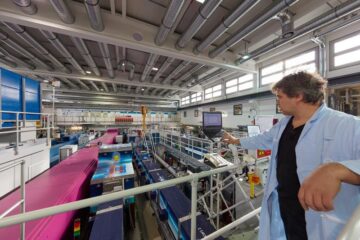Planning in a Time of Crisis? 9th International Model Project Forum 'European Urban Studies'

In a time, where the real estate market is burdened like never experienced throughout the last decades, visions for our urban environment are nevertheless needed to deal with nowadays problems and demands in our cities. Is a shift needed towards a new paradigm in the urbanist practice?
While it is to early to give an answer on how this shift takes place, the discussion of current projects may help to formulate that urbanist practice. What kind of questions arise with the real estate crisis concerning new plans? What is the priority behind new projects? What is the chance and visionary craft of today's projects for tomorrow's city? And what are the requirements that urbanists articulate in their concepts?
In the „Bauhaus Year 2009“, the ,European Urban Studies' celebrate their 10th anniversary and welcome excellent project partners of the 'Model Projects European Urban Studies' at the 9th International Model Project Forum to present current projects and best practice in urbanism.
Practice partners from the private sector, administration and applied sciences, as well as post-graduate students of the master-programmes „European Urban Studies“ and „Integrated Urban Studies“ present their experience in the practice of urbanism.
They are covering interdisciplinary projects from Bulgaria, Great Britain, India, Ireland, the Lebanon, the Netherlands, the United States of America and Germany. The scope ranges from coastal zone management to transit oriented development as well as from community planning to questions of high rise development.
The final podium discussion of the conference is dedicated to look for answers to these questions formulated in the conference title PLANNING IN A TIME OF CRISIS? Current projects in urbanism. The projects presented at the conference will be reflected to understand in how far the current practice needs to formulate new demands for future urban development.
Projects from the following model project partners will be presented:
Adelphi Research, Berlin
Calthorpe and Associates, Berkely
DC&E Planning, Berkely
Dienst Ruimtelijke Ordening, Amsterdam
Dublin City Council
gmp von Gerkan, Marg und Partner, Berlin
Inbo, Amsterdam
Machleidt und Partner, Berlin
Platoon Cultural Development, Berlin
Pratt Center for Community Development, Brooklyn
Pro Quartier, Hamburg
RDA Yorkshire Forward, Leeds
RKW – Rhode Kellermann Wawrowsky, Düsseldorf
Space Syntax, London
Stadt Mannheim, Dezernat für Planung, Bauen, Umweltschutz und Stadtentwicklung
Studio One Eleven, Long Beach
Studio Sputnik, Rotterdam
ZUS – Zones Urbaines Sensibles, Rotterdam
* Beginning: 25.02.2009, 19:00 Uhr
* End: 27.02.2009, 16.30 Uhr
* Location: Institut für Europäische Urbanistik, Albrecht-Dürer-Str. 2 99425 Weimar
Convener:
Institute for European Urban Studies
Albrecht-Duerer Strasse 2
99425 Weimar
Germany
Conference Chair:
Institute Director
Prof. Dr. Bernd Nentwig
Professor of Construction Management and Construction Economy
Contact (Organiser):
Dipl.-Ing. (FH) Philippe Schmidt MSc
T: +49-(0)3643-582651
F: +49-(0)3643-582642
Philippe.Schmidt@archit.uni-weimar.de
Media Contact
Weitere Informationen:
http://www.uni-weimar.de/ifeuAlle Nachrichten aus der Kategorie: Veranstaltungsnachrichten
Neueste Beiträge

Bakterien für klimaneutrale Chemikalien der Zukunft
Forschende an der ETH Zürich haben Bakterien im Labor so herangezüchtet, dass sie Methanol effizient verwerten können. Jetzt lässt sich der Stoffwechsel dieser Bakterien anzapfen, um wertvolle Produkte herzustellen, die…

Batterien: Heute die Materialien von morgen modellieren
Welche Faktoren bestimmen, wie schnell sich eine Batterie laden lässt? Dieser und weiteren Fragen gehen Forschende am Karlsruher Institut für Technologie (KIT) mit computergestützten Simulationen nach. Mikrostrukturmodelle tragen dazu bei,…

Porosität von Sedimentgestein mit Neutronen untersucht
Forschung am FRM II zu geologischen Lagerstätten. Dauerhafte unterirdische Lagerung von CO2 Poren so klein wie Bakterien Porenmessung mit Neutronen auf den Nanometer genau Ob Sedimentgesteine fossile Kohlenwasserstoffe speichern können…





















